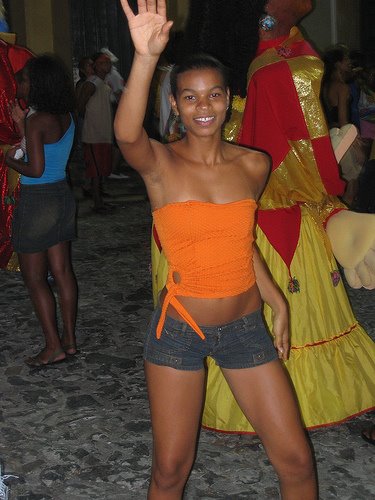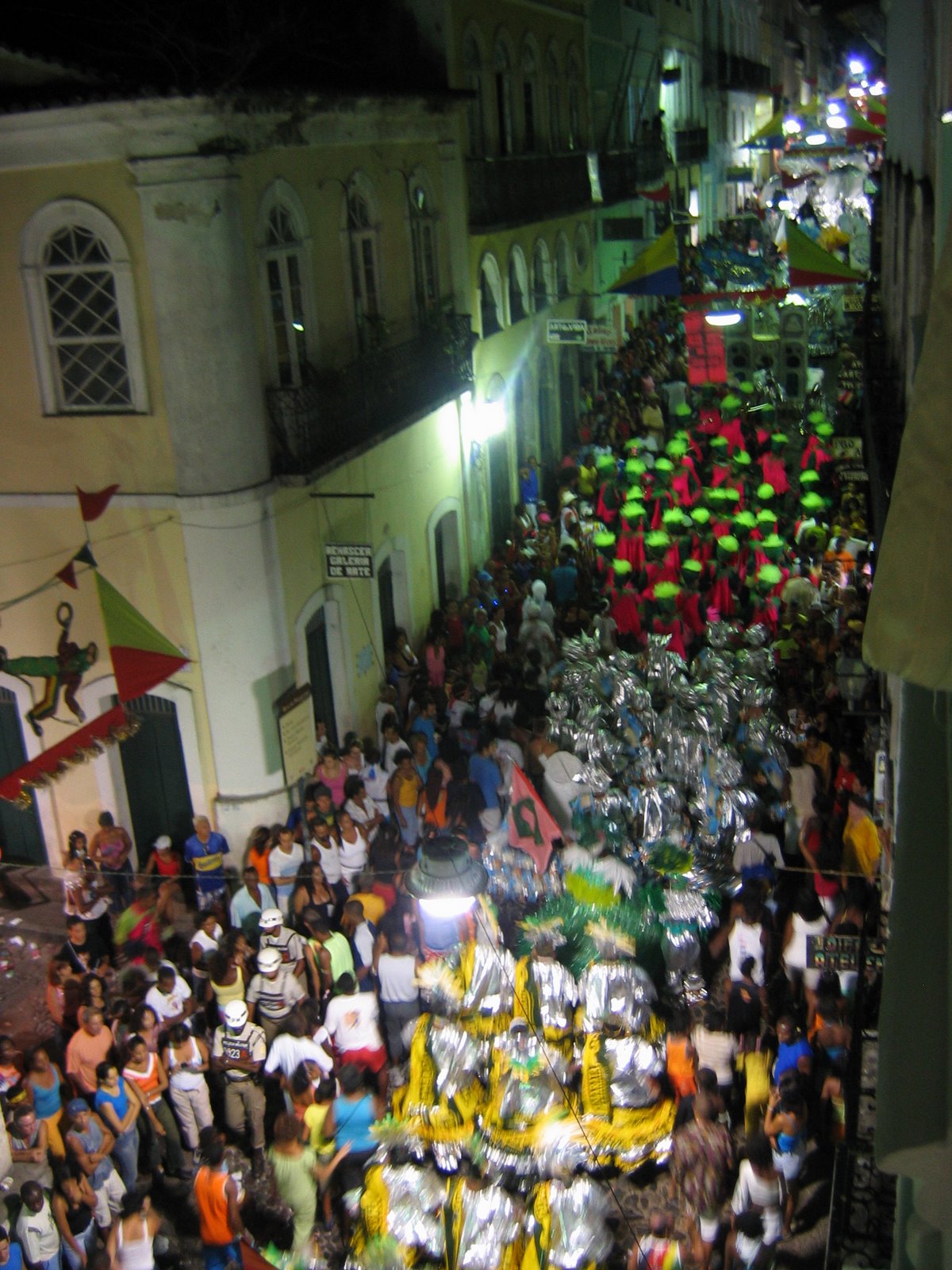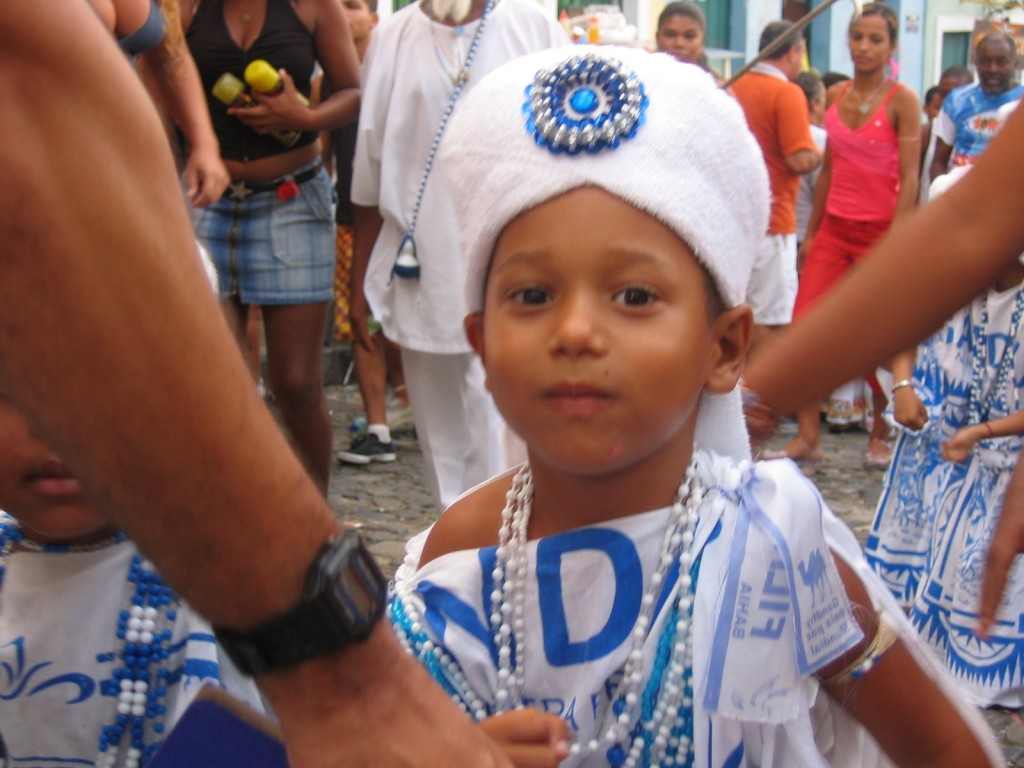Part 1 of a 3-part series on lesser-known, but no-less-hot, Carnival celebrations. While most of the world looks to its more famous neighbor to the south as the epitome of pre-Lenten debauchery, Brazil’s first capital, Salvador da Bahia, is truly where you find Brazilian Carnival. Or, rather, Carnival for Brazilians. You don’t “see” Carnival in Salvador from the sidelines, you live it for six days and nights, non-stop, eating skewered street meat and getting no sleep. Billed as less commercial than Rio’s renowned festivities, Brazilians from north to south pounce on Salvador to dance in the shadow of their favorite pop stars, and maybe even have a quick fling or two with a hottie from another state. Still, Carnival in Salvador offers ample opportunities for both the innocent and the grown-and-sexy to enjoy the combination of history, culture, and unexplainable magic for which Brazil is known.
While most of the world looks to its more famous neighbor to the south as the epitome of pre-Lenten debauchery, Brazil’s first capital, Salvador da Bahia, is truly where you find Brazilian Carnival. Or, rather, Carnival for Brazilians. You don’t “see” Carnival in Salvador from the sidelines, you live it for six days and nights, non-stop, eating skewered street meat and getting no sleep. Billed as less commercial than Rio’s renowned festivities, Brazilians from north to south pounce on Salvador to dance in the shadow of their favorite pop stars, and maybe even have a quick fling or two with a hottie from another state. Still, Carnival in Salvador offers ample opportunities for both the innocent and the grown-and-sexy to enjoy the combination of history, culture, and unexplainable magic for which Brazil is known.
 The colonial capital from 1549 to 1763 and once the largest slave port in Brazil, Salvador holds nearly three million people, over eighty-percent of whom having discernable African ancestry. And the music and dance and food originating here—more than in any other part of Brazil—is mainstream, not just a subculture. There is no place quite like Salvador. Some places come close: pre-Katrina New Orleans with music on every corner, Havana, where salsa and Santería share equal billing.
The colonial capital from 1549 to 1763 and once the largest slave port in Brazil, Salvador holds nearly three million people, over eighty-percent of whom having discernable African ancestry. And the music and dance and food originating here—more than in any other part of Brazil—is mainstream, not just a subculture. There is no place quite like Salvador. Some places come close: pre-Katrina New Orleans with music on every corner, Havana, where salsa and Santería share equal billing. 
But no place captures the convergence of African and European cultures as thoroughly and inextricably as Salvador. The city government has even erected statues in homage to the “Orixá,” the Yoruba pantheon of deities celebrated in Brazilian Candomblé, Spanish Caribbean Santería, and Haitian Vodou, the syncretic religions created when slaves were “converted” to Catholicism. This cross-pollination forms the bedrock of Brazilian culture and is manifested at its purest in Salvador, where anyone can add his or her own flavor to the already rich stew. Carnival is a two-pronged event in Salvador. Family-friendly Pelourinho (“whipping-post” in Portuguese), the city’s church-steepled historic district perched high above the sea, plays host to traditional costumed bands of revelers and samba groups that parade over the cobblestones with interminable energy.
Carnival is a two-pronged event in Salvador. Family-friendly Pelourinho (“whipping-post” in Portuguese), the city’s church-steepled historic district perched high above the sea, plays host to traditional costumed bands of revelers and samba groups that parade over the cobblestones with interminable energy.
Unlike Rio, with its ever-changing samba competition squeezed into a specially-designed stadium, Salvador’s groups remain true to historical themes—grandmothers swirling dervishly as hoop-skirted “Baianas,” white-robed men walking pensively as “Filhos de Gandhy” (Sons of Gandhi)—while be-feathered kids and muscle-toned capoeristas frolic in sunburnt plazas. Clowns and mimes cavort on strategically-placed stages, all-Asian percussion sections tap out lightning-fast sambas, up-and-coming ingénues coo bossa nova classics from back alley cafés, and body-painted teenagers grab unsuspecting tourists for a little shimmy-shaking.
Starting mid-afternoon, Carnival gets down-and-dirty, literally, in the Cidade Baixa (Lower City), with the “trio eletrico” parades in the downtown district of Campo Grande, or along the beach at Barra and Ondina. Essentially gigantic boomboxes hitched to trucks, trios eletricos are moving concerts, topped by wildly popular Brazilian musical acts that belt out gyration-inducing “axé” music, a bawdy combination of samba and reggae.  Timbalada, Olodum, Daniela Mercury, and Ivete Sangalo entertain hundreds of thousands of fans—often drunk, horny, or both—who squeeze into the streets around the trios and are known collectively as “pipoca” (popcorn) because usually the only range of motion in the crowd is vertical. Young people wear the most basic attire, bring nothing more expensive than a disposable camera, and stash their money safely in their undies; older partiers watch the action from bleachers along the sides, a decidedly less-raucous experience but one with a better-stocked bar than on the street.
Timbalada, Olodum, Daniela Mercury, and Ivete Sangalo entertain hundreds of thousands of fans—often drunk, horny, or both—who squeeze into the streets around the trios and are known collectively as “pipoca” (popcorn) because usually the only range of motion in the crowd is vertical. Young people wear the most basic attire, bring nothing more expensive than a disposable camera, and stash their money safely in their undies; older partiers watch the action from bleachers along the sides, a decidedly less-raucous experience but one with a better-stocked bar than on the street.
Still, the intimate contact of thousands of bodies under an infectious rhythm conjures up a natural high that keeps the place rocking until daybreak. Should an unexpected rainstorm arise, clothes come off and the party don’t stop. You, like the Brazilians around you, just let the wet cleanse you of the sweat.
Have you ever been to Carnival in Salvador?


Pingback: Brasil Pra Mim | FLY BROTHER
Pingback: Brasil Pra Mim | FLY BROTHER